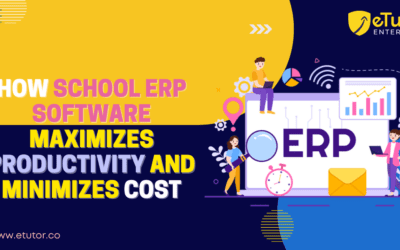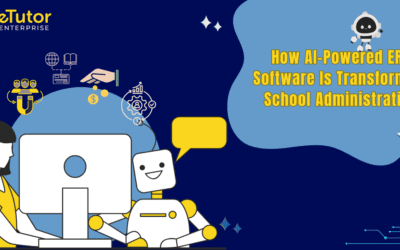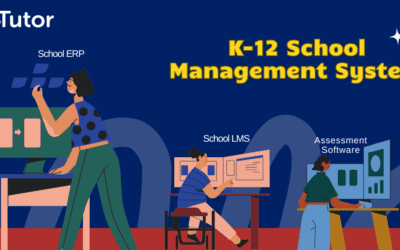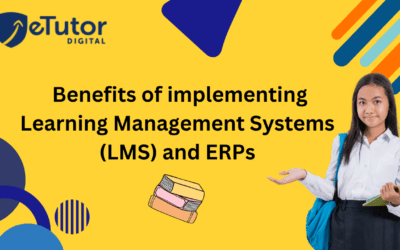5 Reasons Why School ERP Software Is Important | eTutor
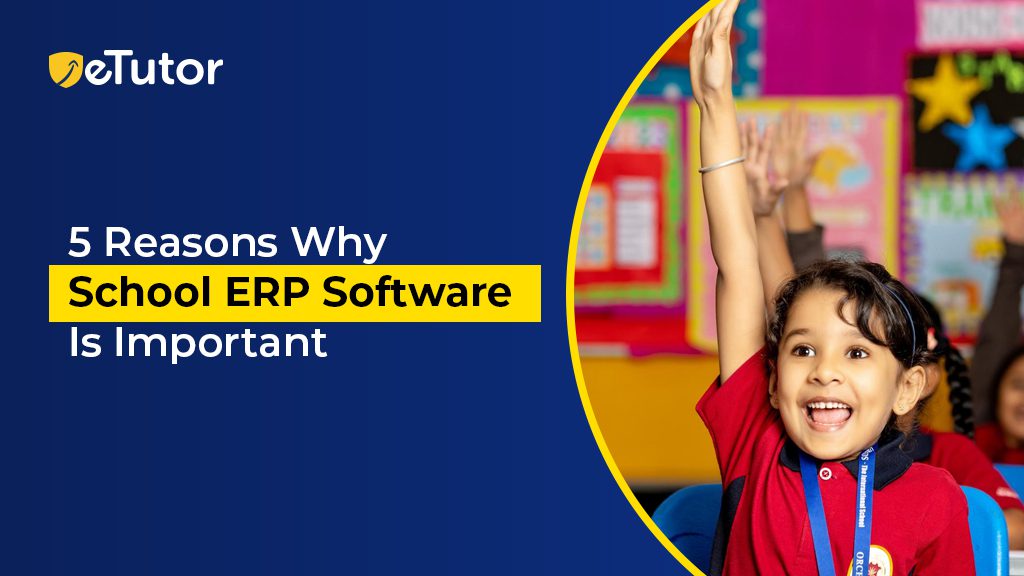
Table of Contents
ToggleIntroduction
In the ever-evolving landscape of education, traditional methods of school management are being rapidly replaced by innovative technologies. One such transformative tool is School ERP (Enterprise Resource Planning) software, which has become increasingly important for educational institutions worldwide.
In this article, we’ll delve into five key reasons why School ERP software is indispensable for modern schools.
What is School ERP?
School ERP is a software solution designed to streamline and centralize the myriad activities within an educational institution. From managing student information, attendance, and grades to facilitating communication between teachers, students, and parents, School ERP serves as an integrated platform that enhances the overall functioning of schools.
5 Reasons Why School ERP Software Is Important
1. Streamlining Administrative Processes:
One of the primary reasons educational institutions turn to School ERP software is to streamline and automate administrative processes. Traditional paperwork and manual data entry are not only time-consuming but also prone to errors. School ERP brings efficiency to tasks such as student enrollment, attendance tracking, gradebook management, and timetable creation.
With a centralized platform, administrators can manage all aspects of school operations seamlessly. From generating reports to monitoring financial transactions, School ERP simplifies complex administrative tasks, allowing staff to focus on strategic initiatives rather than drowning in paperwork.
2. Enhanced Communication and Collaboration:
Communication is the cornerstone of a thriving educational environment. School ERP software facilitates seamless communication and collaboration among teachers, students, and parents. Through integrated messaging systems, announcements, and online forums, stakeholders can easily connect and stay informed about important updates, events, and academic progress.
Parents, in particular, benefit from increased transparency into their child’s educational journey. Real-time access to attendance records, grades, and communication with teachers fosters a more engaged and supportive relationship between parents and the school community.
3. Data-Driven Decision Making:
In an era where data is king, School ERP software empowers educational institutions with valuable insights for informed decision-making. The software captures and analyzes data related to student performance, attendance trends, financial transactions, and more. Administrators can utilize these insights to make data-driven decisions that positively impact the overall functioning of the school.
Whether it’s optimizing resource allocation, identifying areas for improvement in academic programs, or planning for future growth, School ERP provides a robust foundation for strategic decision-making. The ability to track and assess key performance indicators enhances the institution’s responsiveness to challenges and opportunities.
4. Improved Parental Engagement:
Parental involvement is a crucial factor in a student’s academic success. School ERP software bridges the gap between schools and parents, fostering improved engagement. Parents can access a dedicated portal to monitor their child’s attendance, academic performance, and communication from teachers.
Features like online gradebooks and real-time notifications keep parents informed about their child’s progress, enabling them to offer timely support and encouragement. The transparent and collaborative nature of School ERP builds trust and strengthens the partnership between parents and educators in shaping a student’s educational journey.
5. Cost-Efficiency and Resource Optimization:
While the initial investment in School ERP software might seem significant, the long-term benefits translate into cost-efficiency and resource optimization. The automation of routine tasks reduces the workload on administrative staff, allowing them to focus on more value-added activities.
Financial management modules within School ERP streamline fee collection, payroll processing, and budgeting. The software provides a comprehensive view of the institution’s financial health, enabling administrators to identify cost-saving opportunities and allocate resources more effectively.
How eTutor School ERP software benefits?
eTutor School ERP (Enterprise Resource Planning) Software offers a comprehensive set of features designed to streamline various aspects of school management. Here are some key benefits, with a focus on admission, attendance, and fee management features:
Efficient Admission Process:
● Simplified Admission Forms: eTutor facilitates the creation and management of digital admission forms, making the application process smoother for both students and administrators.
● Document Management: The software can store and organize admission-related documents, ensuring easy retrieval and compliance with documentation requirements.
● Online Application Submission: Students can submit admission applications online, reducing paperwork and manual data entry.
● Document Management: The software can store and organize admission-related documents, ensuring easy retrieval and compliance with documentation requirements.
● Online Application Submission: Students can submit admission applications online, reducing paperwork and manual data entry.
Automated Attendance Management:
● Biometric/RFID Integration: eTutor may integrate with biometric or RFID systems to automate attendance tracking, reducing the likelihood of errors and ensuring accurate records.
● Real-time Monitoring: Teachers and administrators can monitor attendance in real-time, allowing for prompt intervention in case of irregularities.
● Automated Notifications: The system can send automated notifications to parents or guardians if a student is marked absent, fostering better communication.
● Real-time Monitoring: Teachers and administrators can monitor attendance in real-time, allowing for prompt intervention in case of irregularities.
● Automated Notifications: The system can send automated notifications to parents or guardians if a student is marked absent, fostering better communication.
Fee Management:
● Fee Collection Automation: eTutor helps automate the fee collection process, allowing for online payments, which can reduce the administrative burden associated with manual fee collection.
● Fee Structure Customization: The software may offer flexibility in designing and customizing fee structures based on various parameters, accommodating different fee categories and payment plans.
● Late Fee Management: eTutor can automate the calculation and management of late fees, helping to enforce timely payments and reduce financial discrepancies.
● Fee Structure Customization: The software may offer flexibility in designing and customizing fee structures based on various parameters, accommodating different fee categories and payment plans.
● Late Fee Management: eTutor can automate the calculation and management of late fees, helping to enforce timely payments and reduce financial discrepancies.
Data Accuracy and Integration:
● Centralized Database: eTutor School ERP maintains a centralized database for student information, ensuring data accuracy and reducing redundancy.
● Integration with Other Modules: The admission, attendance, and fee management features are likely integrated seamlessly, allowing for a cohesive and efficient school management system.
● Integration with Other Modules: The admission, attendance, and fee management features are likely integrated seamlessly, allowing for a cohesive and efficient school management system.
Communication and Reporting:
● Parental Communication: The software may facilitate communication between schools and parents, providing updates on admissions, attendance, and fee-related matters.
● Custom Reports: eTutor can generate custom reports related to admission statistics, attendance trends, and fee collections, offering valuable insights for decision-making.
● Custom Reports: eTutor can generate custom reports related to admission statistics, attendance trends, and fee collections, offering valuable insights for decision-making.
Compliance and Security:
● Regulatory Compliance: eTutor School ERP may include features to ensure compliance with educational regulations and standards.
● Security Measures: The software likely incorporates security measures to protect sensitive student and financial data, maintaining the confidentiality and integrity of information.
● Security Measures: The software likely incorporates security measures to protect sensitive student and financial data, maintaining the confidentiality and integrity of information.
Conclusion
In conclusion, School ERP software has become an integral component of modern education management. Its impact extends beyond administrative convenience, reaching into the realms of communication, data-driven decision-making, parental engagement, and cost-efficiency. Educational institutions that embrace School ERP software position themselves for enhanced operational excellence and a more enriching experience for students, teachers, and parents alike.
As the educational landscape continues to evolve, the adoption of School ERP software is not merely a technological upgrade; it is a strategic investment in the future of education. The software serves as a catalyst for positive change, driving efficiency, collaboration, and excellence in the dynamic and ever-evolving world of education.
Recent Posts
- NTA-Based Hybrid Assessment Software for IIT-JEE Mains, Advanced & NEET
- eTutor Offline Exam Software for IIT-JEE, NEET, and Foundation with Student Performance Analytics
- NEET Test Generator for Academies & K-12 Schools
- How School ERP Software Maximizes Productivity and Minimizes Cost
- How Does ERP Software for Schools Help Educators?

